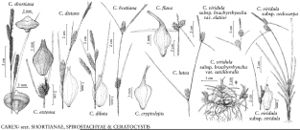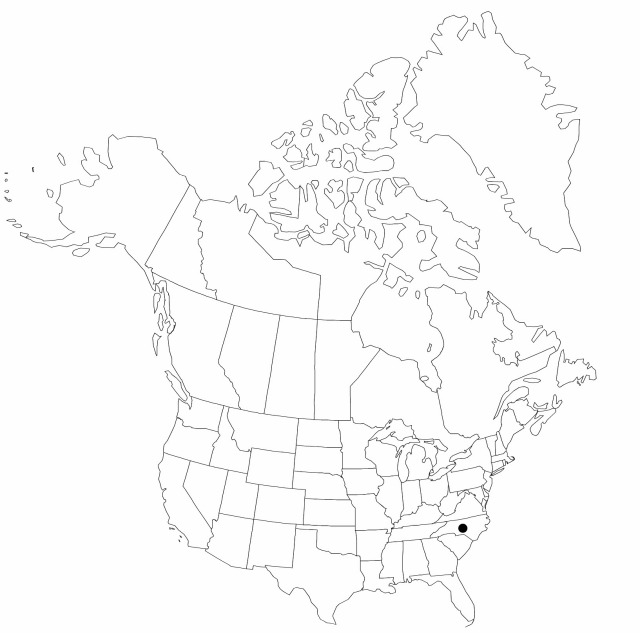Carex lutea
Sida 16: 155, fig. 1. 1994.
Plants cespitose. Culms straight, (40–)65–110(–125) cm, tallest culms 65–125 cm. Leaves of flowering stems shorter than culms, to 28 cm × 1.8–3.8 mm; ligules on distal cauline leaves truncate or rounded. Inflorescences: peduncles of terminal staminate spikes (3–)10–60(–102) mm, 0.7–2.5 length of staminate spikes; bracts 5–25 cm × 1.2–2.5 mm, 0.5–1.3(–1.9) times as long as inflorescences; inner band of sheaths usually concave or truncate (occasionally convex). Spikes: proximal pistillate spikes 1–2(–3), distant, sessile or short-pedunculate, globose to ellipsoid or short-cylindric, 7–27 × 8–11 mm; terminal staminate spikes pedunculate, (9–)17–39 × 1.4–2.5 mm. Scales: pistillate scales pale yellowish green, inconspicuous among perigynia, 2.1–3.3 × 0.9–1.3 mm; staminate scales reddish brown to pale brown, narrowly obovate to narrowly oblong, 2.9–5.6 × 1.2–1.9 mm, margins wide, pale hyaline, apex obtuse to acute. Anthers 2.1–3.6 mm. Perigynia reflexed, yellow to yellowish green, (3.5–)3.9–5.2(–5.8) × 1.4–2.2 mm, apex abruptly narrowed; beak forming angle greater than 20° with body, 1.4–2.2 mm, sparsely scabrous or, occasionally, smooth. Achenes 1.4–1.9 × 1.2–1.5 mm.
Phenology: Fruiting May–Jun.
Habitat: Sandy soils over limestone, in the ecotone between longleaf pine savannas and non-riverine swamp forests, where fire has suppressed shrub dominance, on lime-rich soils
Discussion
Of conservation concern.
Carex lutea, a recently discovered species of the Atlantic Coastal Plain, is widely disjunct from other species of the section. The nearest known population of another member of the section (C. viridula var. viridula) is about 750 km to the north in New Jersey.
Selected References
None.

